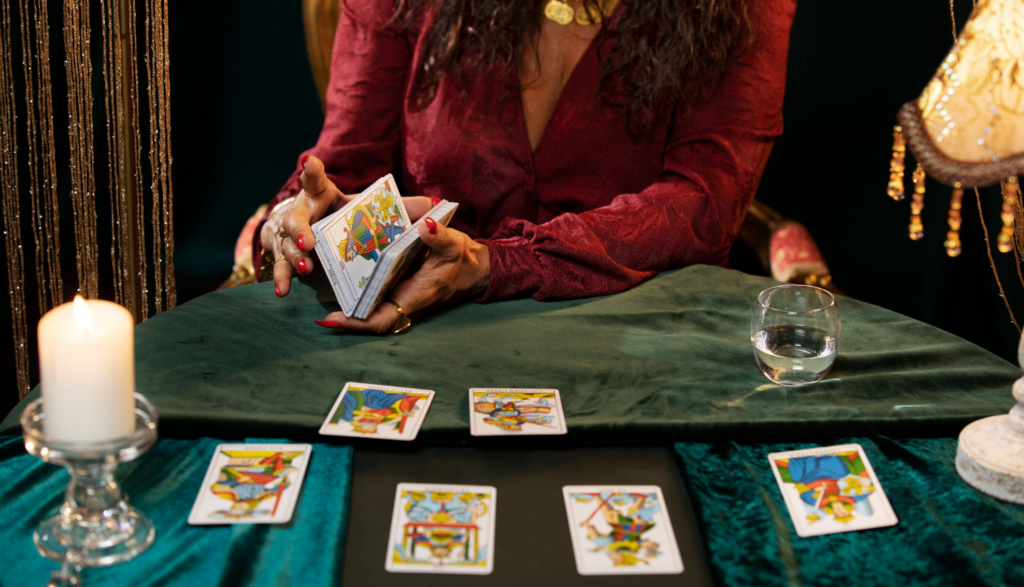Tarot reading is a deeply intuitive and insightful practice that can offer guidance, clarity, and spiritual growth. However, like any spiritual or divinatory tool, it requires patience, practice, and mindfulness to fully unlock its potential. Whether you’re a beginner or have been reading for some time, it’s important to be aware of common mistakes that can hinder your progress. By avoiding these missteps, you can create a more meaningful and accurate Tarot practice.
Relying Too Heavily on Books
While Tarot books can be a helpful resource, relying solely on them for interpretations can limit your ability to connect with the cards on a deeper level. Each Tarot deck has its own energy, and you may find that certain symbols, colors, or imagery resonate with you differently than what a book describes. To truly develop your Tarot practice, it’s essential to trust your intuition and personal impressions of the cards. Use books for reference, but let your own connection with the cards guide you as well.
Overcomplicating the Readings
One of the most common mistakes beginners make is overcomplicating their readings. When you first start, it’s easy to feel like you need to understand every little detail of each card, especially in complex spreads. However, Tarot readings don’t need to be overanalyzed. Instead of focusing on every position or minute symbolism, focus on the cards that stand out to you the most. Allow the messages to come through naturally, and trust that the most important insights will be revealed.
Asking Vague Questions
The quality of your Tarot reading is often determined by the quality of the questions you ask. One common mistake is asking vague or overly general questions such as, “What will happen to me in the future?” or “Will I find love?” These types of questions can lead to unclear answers, as Tarot is best suited for specific inquiries. Instead, try to ask questions that are clear and focused. For example, “What can I do to improve my career path?” or “What should I know about my current relationship?” These kinds of questions allow the Tarot to offer more practical, relevant, and insightful guidance.
Ignoring the Reversed Cards
Many Tarot readers, especially beginners, may feel uncertain about the significance of reversed cards. It’s a common mistake to ignore them or assume they always signify negative outcomes. Reversed cards simply represent different energies, often indicating obstacles, hidden influences, or areas where growth is needed. They can offer a deeper layer of insight into your readings, pointing out areas where you might be blocking yourself or where more attention is needed. Embrace both upright and reversed cards in your practice—they each bring valuable information to the table.
Related: What It’s Like to Work, Play, and Live as an Air Sign
Not Taking Time to Reflect
After a Tarot reading, it’s easy to rush into action based on the information received. However, one of the most important aspects of Tarot practice is reflection. Tarot readings can be emotionally charged and offer profound insights that may take time to process. Take time after each reading to sit with the cards, meditate on their meaning, and allow your thoughts to settle. Sometimes, the messages from the Tarot unfold gradually, revealing deeper layers of wisdom over time.

Reading for Others Too Soon
Many new readers are eager to start reading for friends or family, but it’s essential to have a solid understanding of the cards and how they speak to you before offering readings to others. Practicing on yourself first helps you build confidence and intuition. When reading for others, remember that Tarot is a tool for guidance, not a substitute for professional advice (e.g., legal, medical, or financial). Be mindful of how you communicate the messages to others, especially when dealing with sensitive issues.
Overusing the Cards
Another common mistake is doing too many readings in a short period. While it can be tempting to turn to the cards for answers whenever you’re feeling uncertain, constantly asking the same question or doing multiple readings in one day can lead to confusion and overwhelm. It’s best to allow time for the cards to offer their insights and for you to reflect on them. Overusing the Tarot can cloud your judgment and prevent you from seeing the bigger picture. Trust in the wisdom of the cards, and don’t feel the need to ask the same question repeatedly.
Not Creating a Sacred Space
The environment in which you read the Tarot can have a significant impact on your practice. If you’re reading in a rushed or chaotic environment, it can be difficult to fully connect with the cards. Try to create a quiet, peaceful space where you can focus and engage with your intuition. Lighting candles, using crystals, or playing calming music are simple ways to enhance your space. A sacred space helps set the tone for your readings and allows you to approach them with clarity and respect.
Being Afraid of Difficult Cards
Tarot can sometimes present challenging messages, especially when the cards depict struggles, conflict, or loss. It’s easy to feel discouraged when these difficult cards appear, but they are a natural part of the journey. Instead of fearing these cards, approach them as opportunities for growth and insight. Difficult cards often signal areas of life that need attention or change, helping you to confront challenges head-on. Embrace these cards as part of your process, and trust that they are guiding you toward greater awareness.
Related: Horoscope Predictions for Tackling Life’s Unexpected Curveballs
Lacking Consistency
Consistency is key to improving your Tarot practice. Like any skill, Tarot reading takes time and practice to master. It’s important to read regularly, even if it’s just for a few minutes each day. Set aside time to practice, reflect, and grow with the cards. This will help you develop a deeper understanding of the symbolism and strengthen your intuition. Over time, you’ll become more confident and accurate in your readings.
By avoiding these common mistakes and adopting a mindful approach to your Tarot practice, you can enhance your connection to the cards and receive more meaningful insights. Remember that Tarot is a journey of self-discovery, and with patience and practice, you’ll continue to grow and evolve as a reader.





















